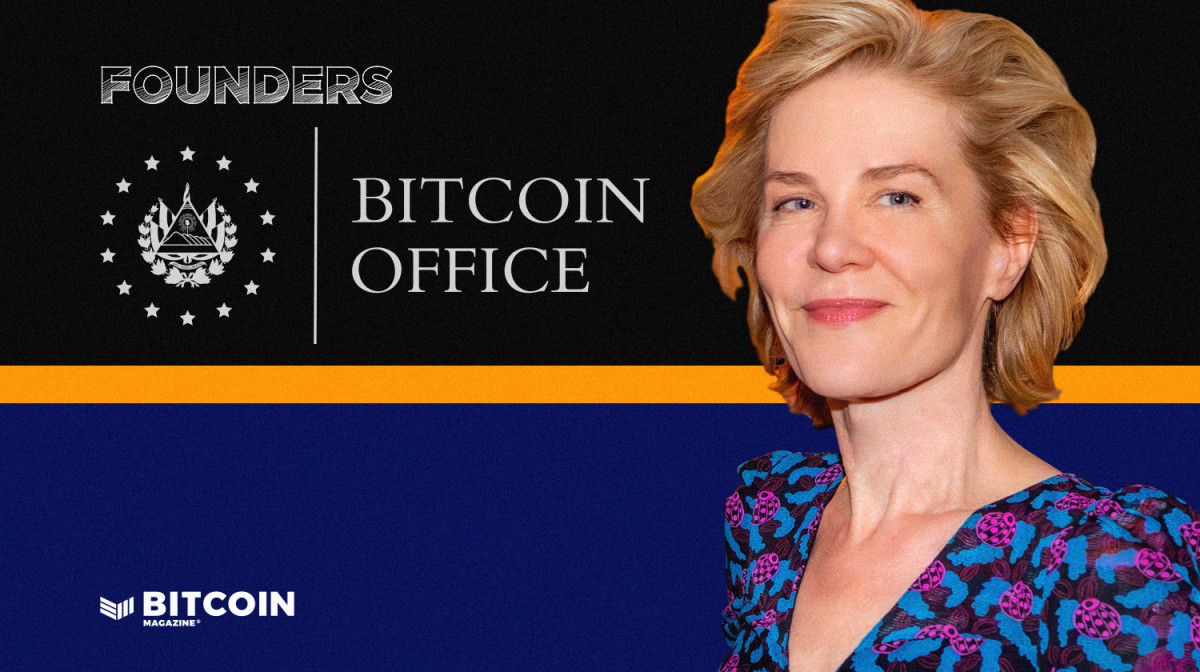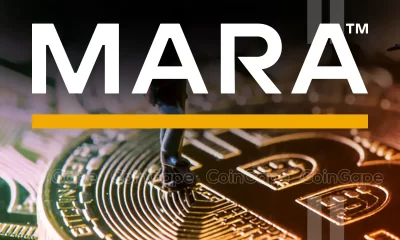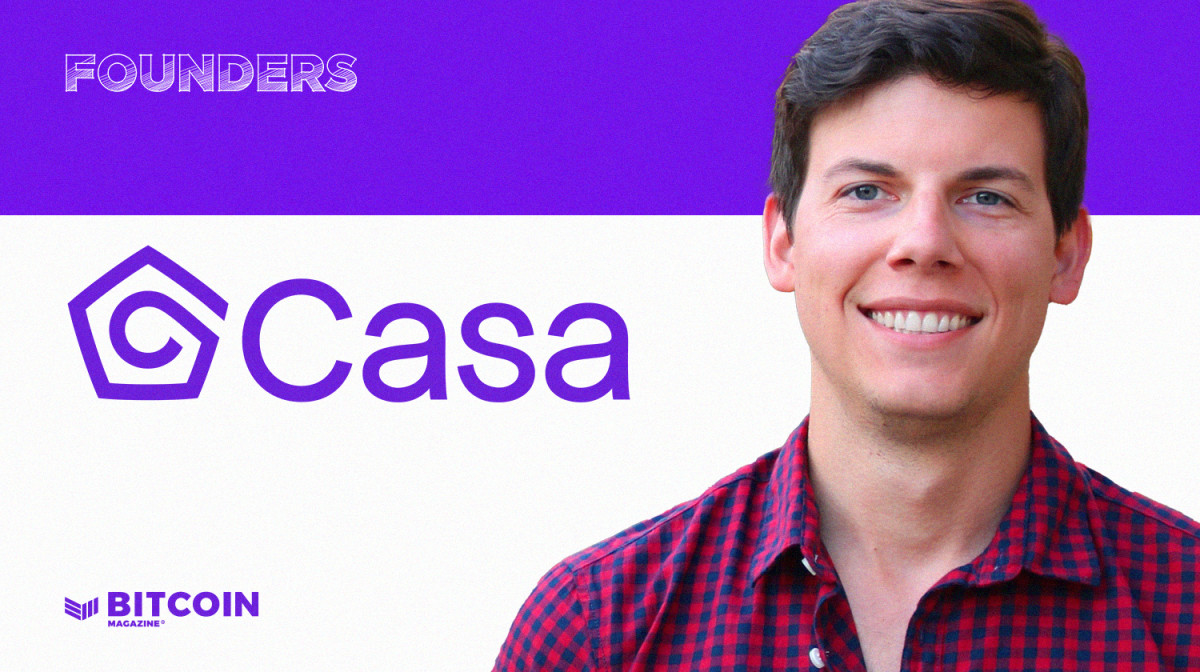business
El Salvador’s Bitcoin Office Celebrates 21 Months of Success, Sets Stage for Renaissance 2.0
Published
2 months agoon
By
admin

“Someone needs to be the keeper and reiterator of the vision. There’s a ton of work to do. When you have to walk a thousand miles and have only taken the first step, it feels like a long way. It really helps if there is someone saying, ‘We are one step closer, and the goal is not a mirage.’” -Steve Jobs
Stacy Herbert, Director of the National Bitcoin Office (ONBTC) of the Office of the President of El Salvador, shared the above quote with me, while beaming with both pride and resolve, at the onset of my interview with her.
It’s clear that Herbert is on a mission, a mission that started in 2010 when she and her partner, Max Keiser, first discovered Bitcoin and became some of the earliest spokespeople for it soon after. This mission now includes the President of El Salvador, Nayib Bukele, as well as the bureaucracy and citizens of El Salvador, which has colloquially become known as “Bitcoin country” in Bitcoin circles.
By many metrics, The Bitcoin Office has already achieved much success since its founding in December 2022. It’s stockpiled 5,836 bitcoin on behalf of the country. It’s educated 80,000 Salvadoran civil servants on what Bitcoin is and why it’s important. It’s helped implement Bitcoin education from kindergarten to university levels through programs like Mi Primer Bitcoin and CUBO+. And it’s attracted entrepreneurs, investors and other bright minds to the country.
While Herbert is proud of these accomplishments, she’s not one to rest on her laurels, especially since she believes that El Salvador’s best days still lie ahead. She has a vision that further Bitcoin adoption in El Salvador will set the stage for a new renaissance, one that will uplift Salvadorans and continue to attract the world’s best to the country. Given the obstacles she’s overcome since first arriving in the country three years ago, it’s difficult to believe she won’t continue to do her part to make this new era for El Salvador happen.
Getting Started in El Salvador
Herbert arrived with Keiser in El Salvador toward the latter part of 2021, near the height of that same year’s bitcoin bull market. Euphoria gave way to despair into 2022, though, when bitcoin’s price tanked in part as a result of broader meltdown in the crypto space.
“When we first arrived three years ago, bitcoin hit $69,000 and then it proceeded to tumble down to something like $16,000,” Herbert told Bitcoin Magazine.
This left Herbert and Keiser tasked with the challenge of explaining to Salvadorans that the collapse of major crypto companies didn’t mean that Bitcoin was dead, nor that it was a mirage.
“FTX collapsed, BlockFi collapsed, and Celsius collapsed,” explained Herbert. “When they saw all those collapses, they thought that it was the same thing as Bitcoin — all these scams, all these frauds.”
Herbert recalled the importance of steering El Salvador in a bitcoin-not-crypto path at that time.
“There were two paths: You could be crypto country or you could be Bitcoin country,” said Herbert.
“With crypto country, you’re competing with Vegas; you’re competing with Macau. The house always wins in those situations. And that’s the same thing if you have a crypto economy. You have some wealthy guys who run the house. The pre-mines, the chip owners, the chip dispensers, they always win,” she added, making the point that she didn’t want to see El Salvador exploited by the crypto industry.
“Or you could go down the route of what Switzerland was to gold, or New York became to US Treasuries. You could build capital markets. You could build an economy. You could build a Singapore 2.0, an Alexandria 2.0, a Florence 2.0. We pushed for this vision.”
Renaissance 2.0
In the vision that Herbert shares with President Bukele and Keiser, a senior advisor to Bukele, El Salvador is in the early stages of ushering in one of the greatest eras of human flourishing the world has ever seen.
Much like the Renaissance, which occurred in what is now northern Italy just over 500 years ago, El Salvador is setting the stage for its own explosion of entrepreneurship and creativity by adopting that hardest money ever known to man.
“Florence first didn’t just didn’t have DaVinci and Michelangelo and Botticelli and all of the architects, the discoverers, the explorers, the astronomers, and then find perfect money,” explained Herbert.
“They found the perfect money of the time — the Florin — and that led to a positive feedback loop of ever more wealth concentrating in Florence versus the other city states of what is now Italy and other regions across Europe,” she added, before sharing that great artists, businesspeople and thinkers flocked to Florence in the wake of its becoming a commercial center.
“We think that same sort of process could happen in El Salvador.”
Embracing Bukele’s Vision
Herbert shared repeatedly in our discussion how El Salvador’s transformation couldn’t have happened without the leadership of Bukele, whose approval rating amongst Salvadorans is still above 90%, making him one of the most popular presidents in the world.
A challenge for the ONBTC now, she claims, is getting the rest of the country to see and embrace his vision.
“You can’t just have President Bukele [believing in Bitcoin],” explained Herbert.
“You need at least a portion of his 80,000 civil servants to understand what he is actually trying to achieve. Remember, as the keeper of the vision, we have to pull everybody along to understand President Bukele’s vision for El Salvador,” she added.
In efforts to get the rest of the country on board, Herbert has hired well-known Bitcoin figures to educate and train Salvadoran Bitcoin developers as well as members of the Salvadoran government.
This work started with Bitcoin developer Jimmy Song coming to El Salvador in March 2022 (before the ONBTC was officially established) to teach developers how to work on Bitcoin Core.
“Jimmy Song taught his Bitcoin course to seven Salvadorans,” recalled Herbert. “One of them was a guy named Mario Flamenco, who ended up becoming my assistant, my number two at the Bitcoin office.”
Giacomo Zucco also came on board to not only teach developers, but also provided three days of Bitcoin education to El Salvador’s civil servants. Herbert explained that the educational efforts are not just to provide El Salvador’s bureaucrats with a deep technical knowledge of Bitcoin, but to reshape their mindset.
“They’re the people that interact with the population,” said Herbert of El Salvador’s civil servants, “so, they need to understand why they are Bitcoin country in terms of the mindset.”
Herbert often referred to the importance of mindset during our discussion. She explained that the work the ONBTC does is about more than just helping people to understand what Bitcoin is, but it’s about mentally and emotionally prepping them to be great.
“In order to be extraordinary, [you have to have] people in the government and in the population who are ready to be extraordinary,” she said.
“We’re training a population to have the mindset to be Florence 2.0, to be Singapore 2.0 — to be something extraordinary,” she added.
“You need everybody to be on the same page in terms of just how important they are. What we’re doing here is extraordinary. What President Bukele has delivered to the country is quite extraordinary.”
Passport Programs
Through ONBTC, Bukele is prepping Salvadorans for great things, while through El Salvador’s passport programs, he’s looking to attract those who have a track record of doing great things.
On April 6, 2024, Bukele announced that El Salvador would issue 5,000 passports to the likes of scientists, doctors and even philosophers.
We're offering 5,000 free passports (equivalent to $5 billion in our passport program) to highly skilled scientists, engineers, doctors, artists, and philosophers from abroad.
This represents less than 0.1% of our population, so granting them full citizen status, including…
— Nayib Bukele (@nayibbukele) April 6, 2024
As Bukele shared in his tweet, these 5,000 passports are technically worth $5 billion. El Salvador now issues passports nearly instantly for those who make a $1 million investment in the country with either BTC or USDT.
While this program was designed to attract top talent from abroad, it also had positive effects on the psychology of the Salvadoran people, according to Herbert.
“What we did with the million dollar price tag worked,” said Herbert.
“If you go back, Salvadoran people started saying, ‘My God, some people were paying $10,000 to coyotes to take them over the border in the US, and my passport is worth $1 million.’ Even if a thousand Salvadorans think that, it changes the mindset enough that it’s a critical seed of change,” she added.
What’s Next for The Bitcoin Office?
Herbert said that ONBTC has some big announcements coming in the next three to four weeks. For now, though, the ONBTC is focused on unveiling the first Bitcoin banks, which she believes will help El Salvador build capital markets.
“Bitcoin banks will come here, and we’ll start seriously building the capital markets that are needed — like we’ve laid the foundation for greatness over the past 21 months,” said Herbert.
Beyond Bitcoin banks, Herbert seems confident that the sky’s the limit as far as what comes next for El Salvador. Thanks to the ONBTC, a foundation has been set for the revitalization of the country.
“We have the education, we have the mindset, we have the rebrand — the greatest rebrand in history — as I call it for El Salvador, and we have an increasing amount of popularity for President Bukele, because he keeps winning,” she said. “We’ve walked a thousand miles in the last 21 months, and we now have another thousand-mile journey to start.”
Editor’s note: We normally profile founders of startups for our Founders series, but, this week, we chose to profile the head of a government institution who’s led that institutions since its inception.
Source link
You may like


Legacy Media’s Transformation: Why Evolution Beats Extinction


Massive Ethereum Buying Spree – Taker Buy Volume hits $1.683B In One Hour


Ethereum lags behind Bitcoin but is expected to reach $14K, boosting RCOF to new high


Bitcoin Miner MARA Buys Another 5771 BTC As Price Nears $100k


Jason "Spaceboi" Lowery's Bitcoin "Thesis" Is Incoherent Gibberish


Bankrupt Crypto Exchange FTX Set To Begin Paying Creditors and Customers in Early 2025, Says CEO
business
MicroStrategy Boosts Convertible Notes Offering to $2.6 Billion to Buy Even More Bitcoin
Published
2 days agoon
November 20, 2024By
admin

MicroStrategy’s thirst for Bitcoin cannot be quenched, despite holding over $31 billion worth.
Barely two days after announcing a plan to sell $1.75 billion worth of convertible notes as a means to buy up more of the world’s top cryptocurrency, the firm said on Wednesday that it has expanded that offering to $2.6 billion worth of notes.
Michael Saylor, MicroStrategy’s co-founder and executive chairman, said the move was made due to “high demand” for the new notes over the last 48 hours.
Given high demand, we upsized our $MSTR offering of 0% convertible bonds due 2029 from $1.75 billion to $2.6 billion, including a $400 million greenshoe option, and priced it at a 55% conversion premium.
— Michael Saylor⚡️ (@saylor) November 20, 2024
As with those initially offered on Monday, the additional zero-interest senior notes announced today will mature in 2029 and are available only to qualified institutional buyers. They will be eventually redeemable for cash, MicroStrategy stock, or a mix of both.
That’s a mighty tempting offer for many Wall Street investors, given the recent, explosive growth of MicroStrategy’s stock. The company, which owns over 331,000 BTC—1.58% of the token’s total possible supply—has seen its stock balloon by over 870% in the last year, in the wake of Bitcoin’s surge. Earlier this month, the stock reached an all-time high.
If MicroStrategy manages to raise another $2.6 billion to buy up more Bitcoin, it would be able to purchase some 27,450 BTC at current prices.
While MicroStrategy once billed itself as a business intelligence and software company, the company’s bold Bitcoin wager has upended not just its value to shareholders, but also the way it now sees itself: as the “world’s first and largest Bitcoin treasury company.”
Edited by Andrew Hayward
Daily Debrief Newsletter
Start every day with the top news stories right now, plus original features, a podcast, videos and more.
Source link
business
Marathon Digital Issues $850M Convertible Note Sale to Repurchase Debt, Acquire Bitcoin
Published
3 days agoon
November 20, 2024By
admin

Bitcoin mining company Marathon Digital Holdings (MARA) is issuing $850 million in convertible notes, with the option to expand to $1 billion, as part of plans to repurchase existing debt, acquire Bitcoin, and fund corporate initiatives amid a recovering crypto market.
The Fort Lauderdale, Florida-based firm said Monday it plans to use $199 million of the expected $833 million in net proceeds from the sale to repurchase $212 million of its existing 2026 convertible notes, according to a statement.
The remainder will be allocated to acquiring additional Bitcoin and for general corporate purposes, including working capital, strategic acquisitions, expansion of assets, and repayment of other debt, the company said.
Convertible notes are a type of debt-based financial instrument that a company sells to raise capital. The notes are typically converted into equity shares at a later date, enabling investors to hold partial ownership of the company.
Marathon’s latest offering comes as several firms globally begin acquiring and holding Bitcoin on their balance sheet following a market rally that has catapulted the price of the world’s oldest crypto to more than $94,000.
The most prominent include MicroStrategy, holding up to $30 billion in Bitcoin, and Japan’s Metaplanet, which has scooped up more than 1,000 BTC this year, worth roughly $93 million to date.
Meanwhile, Semler Scientific (SMLR) acquired nearly $18 million in bitcoin earlier this month, the company said in a statement.
Starting December 1, 2027, holders of Marathon’s convertible notes can ask the company to repurchase them for cash, though terms may change if major events like mergers, acquisitions, or delisting occur.
The notes, which mature on March 1, 2030, can also be converted into cash, MARA stock, or a mix of both, the company said.
The Bitcoin miner’s stock traded at $19.86 on Tuesday, up 9% on the day, while its after-hours price remains little changed, Google Finance data shows.
Edited by Sebastian Sinclair
Daily Debrief Newsletter
Start every day with the top news stories right now, plus original features, a podcast, videos and more.
Source link
business
Bitcoin Multisig Company Casa Makes Self-Sovereignty Easy
Published
3 days agoon
November 19, 2024By
admin

Company Name: Casa
Founders: Nick Neuman, Jameson Lopp and others
Date Founded: Late 2017
Location of Headquarters: Remote
Website: https://casa.io/
Public or Private? Private
Being self-sovereign isn’t easy — especially if you aren’t technically-minded.
The team at Casa gets this and this is why, for over six years, the company has been helping customers secure their bitcoin in multisig wallets (also referred to as multi-key vaults).
The company was the first to offer an easy-to-use version of such a product that also came with customer support. It was Casa’s plan from the onset to be there for their customers, as this type of support was lacking in the broader crypto industry.
“The service element was what was missing from a lot of solutions out there,” Casa co-founder and CEO Nick Neuman told Bitcoin Magazine.
“People need help doing this stuff, especially for large amounts of money. It was always the plan to support customers, because it was impossible to get support from exchanges or hardware wallets,” he added.
“So, we just took a very support-heavy and user experience focused approach to everything.”
Casa’s approach has paid off, as the company has become a household name in the Bitcoin and crypto space, and has come a long way since Neuman first had the idea for a company like Casa seven years ago.
How Casa Started
It was toward the latter part of the 2017 bitcoin bull run when Neuman had grown tired of his previous work in finance and tech, and found himself down the proverbial Bitcoin (and crypto) rabbit hole. By February 2018, he had an idea for a company and entered himself into a hackathon to attempt to bring the idea to life.
“I participated in the first ETHDenver hackathon,” said Neuman.
“I went in with an idea that I called key split, which was basically taking a private key using Shamir secret sharing and creating a social recovery mechanism,” he added.
“I recruited a couple of people at the hackathon to build it with me, and we ended up winning.”
Neuman quit his job and set out to start a company around this technology he and his team had created. But word had gotten out about his victory at ETHDenver, and the previous CEO of Casa, who was the head of the company before it pivoted to offering multisig wallets, reached out to Neuman, asking him to come on board.
It was after learning that Casa had just recruited Jameson Lopp, self-described “professional cypherpunk” and now Chief Security Officer at Casa, that Neuman decided to join the team.
“I was like, ‘Well, Jameson’s going to be an unfair advantage,’” recalled Neuman with a chuckle. “Instead of starting my own company, I’m going to join.”
Soon after Neuman came on board, Casa retired its then flagship product, the Casa Node, and the company shifted its focus to user-friendly multi-key vaults, a much needed product at the time. Before Casa, multisig software was so complicated that even Neuman himself struggled to use it.
“There was the Armory multisig wallet and the Glacier protocol,” recounted Neuman.
“Glacier wasn’t even software. It was like a giant GitHub repo that you had to follow in order to set up your cold storage. Armory was super janky, too. I remember trying to use it once, and I couldn’t figure it out,” he added.
“We were the first to create multisig that was usable.”
How Casa Works
Casa offers users two main set ups. The first is a five-key vault, which includes three keys on three different hardware wallets, one on the user’s phone (which is backed up securely in the cloud) and one that Casa holds.
This was Casa’s first multisig product, which it rolled out while the company primarily focused on serving customers with a high net worth in bitcoin. Casa learned an important lesson while serving these clients, which was that even if developers create easy-to-use software, people still want an expert there supporting them as they use it — especially if they’re securing a lot of value.
“When you’re dealing with millions of dollars worth of Bitcoin, you really want to have an expert there who helps make sure that you don’t make a mistake,” said Neuman.
Casa’s other main product is for those who might not be sitting on bitcoin whale-type wealth, but who still hold enough bitcoin where a less-than-ideal security setup has the potential to keep them awake at night.
This product is Casa’s three-key vault, which the company brought to market in early 2019. It includes a key on a hardware wallet, a key on the user’s phone (which can be swapped out for another key on a second hardware wallet if the user prefers) and a key that Casa holds.
Casa began offering this setup because it “always wanted to be able to offer great security and usability to as many people as possible,” according to Neuman.
New Casa Services And Features
In the past year, Casa has further broadened the services it offers.
Two weeks ago, it announced its Enterprise Plan, which enables companies to more easily secure their bitcoin treasuries.
“We’ve had businesses using Casa for self-custody for years, but they were always using our retail plans and just making it work,” explained Neuman.
“We changed that, though, because I think corporate treasuries holding bitcoin has been popularized by MicroStrategy. We actually see that as a growing trend that’s worth taking advantage of, and we’re hearing from more Bitcoin companies that are storing bitcoin on their balance sheet that they need help with security,” he added.
This summer, Casa also began enabling users to replace hardware wallets used in their vaults with YubiKeys.
“We see people struggle with hardware wallets all the time, and so we were thought ‘How can we make this simpler?’” said Neuman. “We pieced together a couple of new pieces of technology that have passkey and and YubiKey key capabilities and were able to build something that hadn’t been done before.”
And in March, Casa launched Casa Inheritance, a service that makes it easier for the loved ones of Casa users to access the bitcoin secured in the vaults in the event of a user’s death.
“With Inheritance, we heard from our customers all the time ‘Okay, I feel good about my Casa setup, but I’m worried about what happens if I die,’” explained Neuman. “So, we built that feature to make it super easy for their family to recover the bitcoin in case the main account holder dies.”
Normalizing Multisig
Despite all of the work Casa has done in the last six years, some still have an emotional block when it comes to switching to a multisig setup. Whether it’s because this type of wallet format was more difficult to enable years ago or because it’s understandably anxiety-provoking to make changes to one’s bitcoin security, people seem to drag their feet when it comes to using a multisig setup — even if they really want to — according to Neuman.
“They hear the word ‘multisig’ and they’re like, ‘That’s too hard,’” explained Neuman. “What they don’t realize is that to get started with multisig with Casa, you can use your same hardware wallet, and it is literally the same amount of effort as using a hardware wallet, but you significantly improve your security by doing it.”
Neuman thinks that more people will come around and that multisig will become more widely adopted, especially during a bull market.
“It takes the price of bitcoin going up where people suddenly have more value to secure,” said Neuman. “And it takes people hearing from their friends ‘Yeah, I’m doing multisig and it’s not as hard as it sounds.”
For those that do get the urge to try Casa, the company is allowing people to try the service at no charge for a month.
Neuman feels that as more users come on board, it will not only benefit them, but potentially the industry at large as well.
“If we can make it out of this bull market without another massive blow up like FTX because we’ve helped more people self-custody in a way that they feel good about, that feels like a real win to me.”
Source link

Legacy Media’s Transformation: Why Evolution Beats Extinction

Massive Ethereum Buying Spree – Taker Buy Volume hits $1.683B In One Hour

Ethereum lags behind Bitcoin but is expected to reach $14K, boosting RCOF to new high

Bitcoin Miner MARA Buys Another 5771 BTC As Price Nears $100k

Jason "Spaceboi" Lowery's Bitcoin "Thesis" Is Incoherent Gibberish

Bankrupt Crypto Exchange FTX Set To Begin Paying Creditors and Customers in Early 2025, Says CEO

Top crypto traders’ picks for explosive growth by 2025

3 Tokens Ready to 100x After XRP ETF Gets Approval

Gary Gensler’s Departure Is No Triumph For Bitcoin

Magic Eden Token Airdrop Date Set as Pre-Market Value Hits $562 Million

Blockchain Association urges Trump to prioritize crypto during first 100 days

Pi Network Coin Price Surges As Key Deadline Nears

How Viable Are BitVM Based Pegs?

UK Government to Draft a Regulatory Framework for Crypto, Stablecoins, Staking in Early 2025

Bitcoin Cash eyes 18% rally
182267361726451435

Top Crypto News Headlines of The Week

Why Did Trump Change His Mind on Bitcoin?

New U.S. president must bring clarity to crypto regulation, analyst says

Ethereum, Solana touch key levels as Bitcoin spikes

Will XRP Price Defend $0.5 Support If SEC Decides to Appeal?

Bitcoin Open-Source Development Takes The Stage In Nashville

Bitcoin 20% Surge In 3 Weeks Teases Record-Breaking Potential

Ethereum Crash A Buying Opportunity? This Whale Thinks So

Shiba Inu Price Slips 4% as 3500% Burn Rate Surge Fails to Halt Correction

‘Hamster Kombat’ Airdrop Delayed as Pre-Market Trading for Telegram Game Expands

Washington financial watchdog warns of scam involving fake crypto ‘professors’

Citigroup Executive Steps Down To Explore Crypto
Mostbet Güvenilir Mi – Casino Bonus 2024

Bitcoin flashes indicator that often precedes higher prices: CryptoQuant
Trending

 2 months ago
2 months ago182267361726451435

 24/7 Cryptocurrency News3 months ago
24/7 Cryptocurrency News3 months agoTop Crypto News Headlines of The Week

 Donald Trump4 months ago
Donald Trump4 months agoWhy Did Trump Change His Mind on Bitcoin?

 News3 months ago
News3 months agoNew U.S. president must bring clarity to crypto regulation, analyst says

 Bitcoin4 months ago
Bitcoin4 months agoEthereum, Solana touch key levels as Bitcoin spikes

 Price analysis3 months ago
Price analysis3 months agoWill XRP Price Defend $0.5 Support If SEC Decides to Appeal?

 Opinion4 months ago
Opinion4 months agoBitcoin Open-Source Development Takes The Stage In Nashville

 Bitcoin4 months ago
Bitcoin4 months agoBitcoin 20% Surge In 3 Weeks Teases Record-Breaking Potential


